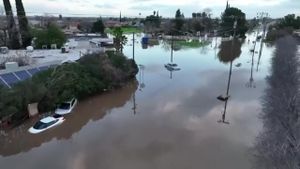On February 8, 2025, Munich became the site of one of the largest pro-democracy demonstrations seen in Germany, attracting participants from diverse backgrounds. Under the motto "Democracy Needs You!", the rally convened at the Theresienwiese, gathering estimates of around 200,000 to 320,000 individuals by the time the event concluded. The overwhelming turnout indicated the community's deep concern over rising right-wing extremism, particularly the increasing influence of the Alternative for Germany (AfD) party.
Initially planned for the Geschwister-Scholl-Platz near the Ludwig-Maximilians University, the rally was moved to Theresienwiese due to the unexpectedly high interest, far exceeding the previous estimate of just 75,000 participants. Organizers, including the coalition "München ist bunt!", expressed hope and excitement at the vast numbers gathered to send a clear message for tolerance, diversity, and active democracy.
According to police reports, the peak attendance reached approximately 250,000 participants, with organizers claiming numbers hitting nearly 320,000. "People are here to send the message: we will not tolerate extremism or hatred," Micky Wenngatz from "München ist bunt!" stated emphatically. "Democracy needs everyone, especially now," she continued, setting the tone for the speeches and performances throughout the day.
The participants represented various segments of society, with support coming from over 150 organizations, including civic groups, church entities, and even local football clubs like FC Bayern and TSV 1860. Each group contributed to the vibrant atmosphere evidenced by colorful banners, chants, and music.
Among the vocal participants was Christiane Benner, the leader of IG-Metall, who addressed the crowd: "We stand for the fundamental right to political asylum!" The emphasis on solidarity with refugees and migrants was apparent, reflecting growing worries about anti-immigrant policies and sentiments found within certain political factions. Many attendees carried signs with messages like "Fascism cannot be combated with deportations" and "Racism and hatred are not alternatives," articulately countering the narrative presented by right-wing parties.
The gathering was marked by music ranging from drummers to bands, boosting the morale and keeping spirits high, as attendees celebrated their shared commitment to democracy.
Despite concerns about the potential for unrest or violence—stimulated by the political climate—the event concluded without any significant incidents. Local law enforcement, which deployed around 300 officers, reported positive outcomes, noting the peaceful environment and the festive atmosphere. "We had anticipated trouble, but it remained completely peaceful," stated Thomas Schelshorn, speaking on behalf of Munich's police force.
Participants were unified not only by their stance against right-wing extremism but also by the desire to engage critically with current political discourse. Young activists, such as 19-year-old Maren Mitterer from Fridays for Future, voiced concerns about rising hate and exclusionary rhetoric. "Though it may be tempting to lose hope, we must continue to fight for our rights and the values of democracy!" she proclaimed, inspiring those surrounding her.
The crowd represented not only the people of Munich but also many visitors from surrounding regions, as individuals, including families and constituents from cities far and near, arrived via public transport. To accommodate the expected high turnout, public transit schedules were adjusted, and lines were reinforced to help participants reach Theresienwiese safely. The Munich transport company made efforts to increase the availability of U-Bahn trains leading to the protest, partially alleviating the crowd's travel concerns.
Feedback from attendees post-demonstration reflected high levels of satisfaction with the event's organization and success. Some participants opted to gather afterward at local cafes to share their experiences and resolve to remain engaged with civic matters.
The tremendous attendance not only highlighted the people's unity against rising extremism but also demonstrated the strength of collective voices ready to defend democracy. The actions of February 8 serve as both warning and inspiration, reinforcing the commitment to uphold democratic values amid challenging political times.
"If our democracy needs us, we will be there!" This echoed sentiment encapsulated the spirit of the day, promising continued activism against any threats to democratic society.



